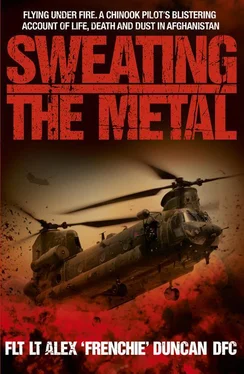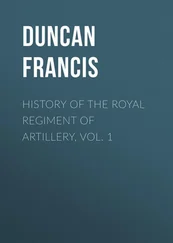August 18th saw us back on the HRF/IRT cycle back at Bastion. It felt good to be back doing some proper work again. We all know that taskings are vital to the operation, but I think most of us felt more of a sense of achievement on the IRT because we could see first-hand that we were making a difference.
While we were on HRF, Sir Richard Dannatt, the then Chief of the General Staff (CGS), was undertaking a tour of Helmand Province. Now Dannatt was a really, really good bloke, a proper soldiers’ soldier, and the lads really liked and respected him. He was like a breath of fresh air compared to most of the faceless generals who’d preceded him and he garnered a lot of respect from the rank and file when he wilfully stepped the wrong side of the political divide as far as the PM and his Cabinet were concerned, by refusing to back the Government line. Dannatt infuriated Gordon Brown who, as the media have widely reported, was never the military’s greatest fan, by speaking out on everything from our strategy in Iraq and Afghanistan to soldiers’ pay and conditions. He was refreshingly honest, spoke it as he saw it and was respected and well liked by all of us.
He was at Lashkar Gah, where I assumed he’d been taken the day before by one of the cabs on tasking. We were tasked to pick him up and take him to Shorabak, which was the base where all the ANA were trained. After dropping him there, we did some resupply taskings around the province until it was time to collect the CGS.
His easy manner and natural charm were evident the minute we picked him up; he spent a few minutes chatting with the crewmen and then came straight to the front and sat on the jump seat.
‘Welcome aboard Eurotrash, sir,’ I said. He laughed but, perhaps wisely, didn’t ask any more. ‘I assume you’ve been to the front several times now, but have you ever flown to KAF at low level?’
‘No, I haven’t.’
‘Would you like to?’
‘I’d love to,’ he said. ‘Assuming it doesn’t impact your tasking.’
‘It’s the end of a long day; it’ll keep me awake if anything, sir! What we’ll do then is take you down south from Lashkar Gah where there are some brilliant valleys running west to east in the middle of the Red Desert. Fancy some of that?’
‘Sounds great!’
So that’s what we did. We were flying as a pair with Morris and JP; we dropped down to 50ft and flew across the Red Desert to KAF.
‘So sir, what’s going on with regard to new aircraft? Are we going to get Blackhawks or anything else decent?’
‘In short, sadly not. I wanted Blackhawks – far superior aircraft and much more capable platform for what we need – but we got Merlin instead. If I had my choice, it would be Blackhawk and Chinook all the way, nothing else. No Sea King, no Merlin, no Pumas.’
It should be about the right tool for the job but, more often than not, it’s about what is politically expedient and beneficial to those who make the decisions. It’s realpolitik in action again but, as we’re British, we take what we’re given graciously, and somehow still more or less manage to do what is asked of us.
He was very gracious and appreciative when we arrived back at KAF and didn’t rush off, but hung around to chat. He took a genuine interest on the flight back, asking lots of questions, listening and making notes. I found him to be a thoroughly nice chap, really easy to talk to, candid, open and with a manner and approachability that belied his rank as head of the Army. After saying goodbye, I felt genuinely enlightened about a lot of things that were happening in theatre – and in the Army itself. I think he’s a great bloke, really interesting. His retirement from the military was the Army’s – and the Government’s – loss.
He’ll be missed.
In war, there’s neither truth nor lies. It’s not all packaged up and chronological, with answers and successful outcomes to nicely timelined battles. The understanding, order and control – that all comes later, when the exhibitions of photographers’ despatches have taken place, the newspaper and magazine articles have been published and the books by those who were there have been researched, written and reviewed.
War is dynamic, disordered and chaotic. Information and intelligence is king, but they are scarce commodities at the time and valueless in the aftermath. War is confusion. You get snippets. Things get misinterpreted. Viewed through the lens of hindsight, some events appear ludicrous, but at the time they are impossible to interpret in any way other than how they appear. You can only act according to the information you have available at the time.
It took the best part of three years to make sense of the incident that took place in Helmand Province on the evening of Thursday August 23rd. After all the interviews, the investigations, the hearings and coroners’ courts, what we know now is that three British soldiers – Privates Aaron McClure, Rob Foster and John Thrumble from 1st Battalion The Royal Anglian Regiment – were killed in a ‘blue-on-blue’ incident. It took place after their platoon came under heavy fire from a determined Taliban force during a fighting patrol to disrupt enemy activity north-west of Kajaki. During the ensuing firefight, air support was requested from two US F15 aircraft, but the 500lb bomb dropped to take out the enemy positions some 500 yards away struck the compound where the three soldiers and their section were located instead. Privates McClure, Foster and Thrumble were killed instantly and two others soldiers were injured in the incident. It later transpired that the platoon’s forward air controller gave the Americans the correct eight-digit coordinate for the airstrike but, deafened by enemy mortars, he replied ‘Roger’ after they were incorrectly repeated back to him.
Rich and I were at Camp Bastion with Bob and Jim on IRT/HRF rotation that day. We’d been in the JOC when we became aware that something had happened – people were running backwards and forwards way more than usual. There were worried expressions and people went about their tasks with a noticeable sense of urgency. Information was scarce, and what there was was confused. All we knew at the time was that there’d been an ‘incident’ near Kajaki involving The Royal Anglians. We knew there were multiple casualties, but at that stage we didn’t know the ‘who, what, how or why’.
The JOC was right next to The Royal Anglians’ control centre, so we could see how everything was ramping up, and one of the hardest things to witness was the sense of panic in the eyes of their officers. They knew at the time they were looking at three missing from 7 Platoon B (Suffolk) Company – a major loss by any yardstick.
They wanted to scramble us to take some troops up to the area to search for survivors and to recover the injured, but it was really difficult for them to get the order for us to lift because the command structure had just changed. Although we were based out of Bastion, the Chinooks and Apaches were a NATO/ISAF asset, and control had switched to HQ Regional Command South (RC South) under the command of a NATO 2-star General at KAF. Everything now had to be cleared by JHF (A) at Kandahar but they, in turn, had to go up the line to HQ RC South for that clearance before coming back to us. It was a crazy, convoluted and time-consuming chain of command.
We were really desperate to get going and JHF (A) at Bastion wanted us airborne, but it wasn’t their call any longer, so it was hell waiting around to get authorisation to lift. The order had to be thought through and there was a process to follow. It’s about assessing where the incident is – do they scramble an aircraft from Bastion or KAF? What else was going on? What were the risk factors to the aircraft and crew? For the commanders, it was all about balance.
Читать дальше













